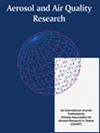2019冠状病毒病封锁期间城市空气污染物的变化
IF 2.5
4区 环境科学与生态学
Q3 ENVIRONMENTAL SCIENCES
引用次数: 4
摘要
本文章由计算机程序翻译,如有差异,请以英文原文为准。
Changes of Air Pollutants in Urban Cities during the COVID-19 Lockdown-Sri Lanka
In response to the COVID-19 pandemic in early 2020, Sri Lanka underwent a nationwide lockdown that limited motor vehicle movement, industrial operations, and human activities. This study analyzes the impact of COVID-19 lockdown on carbon monoxide (CO), ozone (O 3 ), nitrogen dioxide (NO 2 ), sulfur dioxide (SO 2 ), and particulate matter (PM 10 , PM 2.5 ) concentrations in two urban cities (Colombo and Kandy) in Sri Lanka, by comparison of data from the lockdown period (March to May 2020) with its analogous period of 2019 and 2021. The results showed that the percentage change of daytime PM 10 , PM 2.5 , CO, and NO 2 concentration during the lockdown in Colombo (Kandy) is –42.3% (–39.5%), –46% (–54.2%), –14.7% (–8.8%) and –82.2% (–80.9%), respectively. In both cities, the response of NO 2 to the lockdown was the most sensitive. In contrast, daytime O 3 concentration in Colombo (Kandy) has increased by 6.7% (27.2%), suggesting that the increase in O 3 concentration was mainly due to a reduction in NO x emissions leading to lower O 3 titration by NO. In addition, daytime SO 2 concentration in Colombo has increased by 22.9%, while daytime SO 2 concentration in Kandy has decreased by –40%. During the lockdown period, human activities were significantly reduced, causing significant reductions in industrial operations and transportation activities, further reducing emissions and improving air quality in two cities. The results of this study offer potential for local authorities to better understand the emission sources, assess the effectiveness of current air pollution control strategies, and form a basis for formulating better environmental policies to improve air quality and human health.
求助全文
通过发布文献求助,成功后即可免费获取论文全文。
去求助
来源期刊

Aerosol and Air Quality Research
ENVIRONMENTAL SCIENCES-
CiteScore
8.30
自引率
10.00%
发文量
163
审稿时长
3 months
期刊介绍:
The international journal of Aerosol and Air Quality Research (AAQR) covers all aspects of aerosol science and technology, atmospheric science and air quality related issues. It encompasses a multi-disciplinary field, including:
- Aerosol, air quality, atmospheric chemistry and global change;
- Air toxics (hazardous air pollutants (HAPs), persistent organic pollutants (POPs)) - Sources, control, transport and fate, human exposure;
- Nanoparticle and nanotechnology;
- Sources, combustion, thermal decomposition, emission, properties, behavior, formation, transport, deposition, measurement and analysis;
- Effects on the environments;
- Air quality and human health;
- Bioaerosols;
- Indoor air quality;
- Energy and air pollution;
- Pollution control technologies;
- Invention and improvement of sampling instruments and technologies;
- Optical/radiative properties and remote sensing;
- Carbon dioxide emission, capture, storage and utilization; novel methods for the reduction of carbon dioxide emission;
- Other topics related to aerosol and air quality.
 求助内容:
求助内容: 应助结果提醒方式:
应助结果提醒方式:


